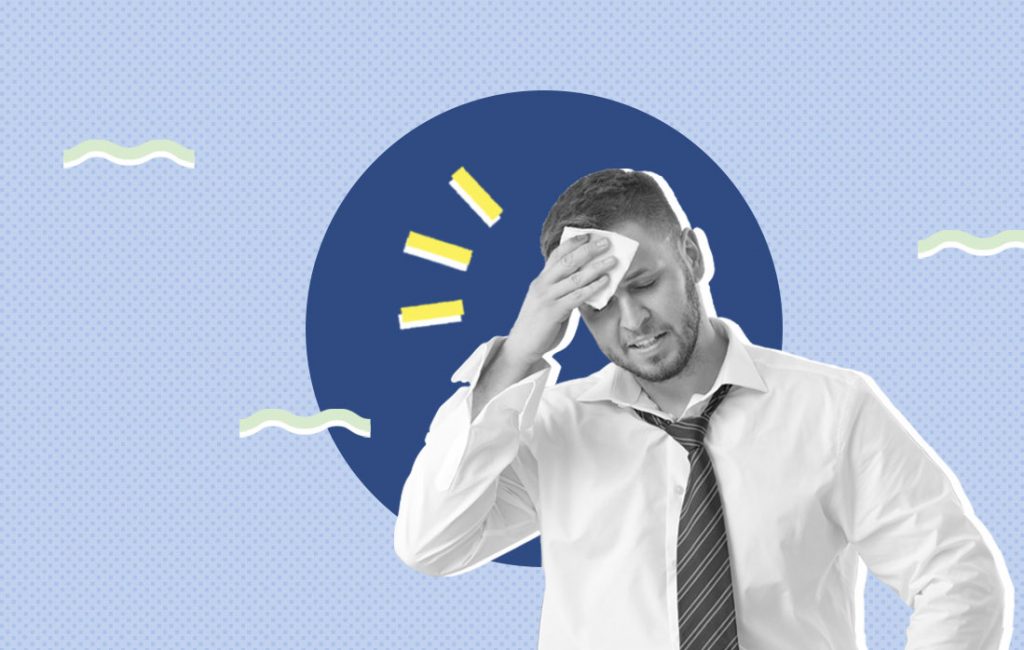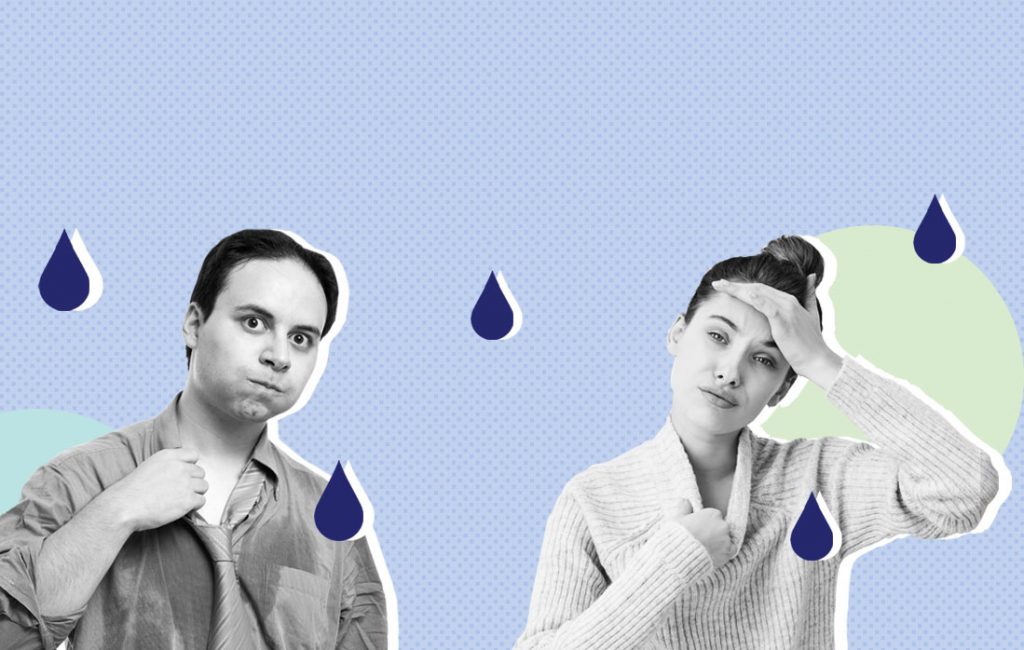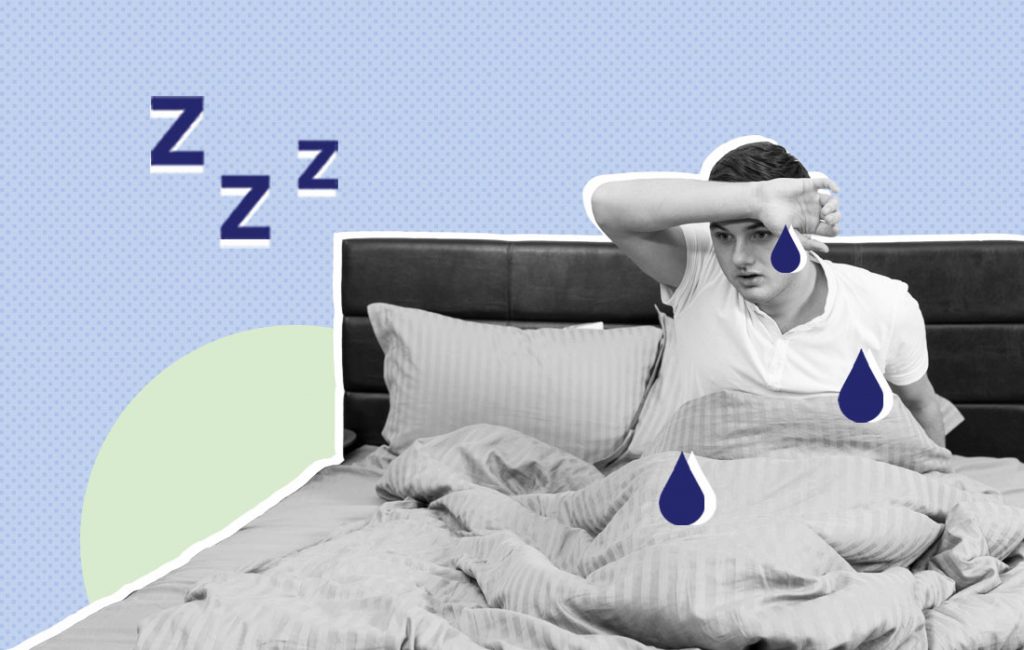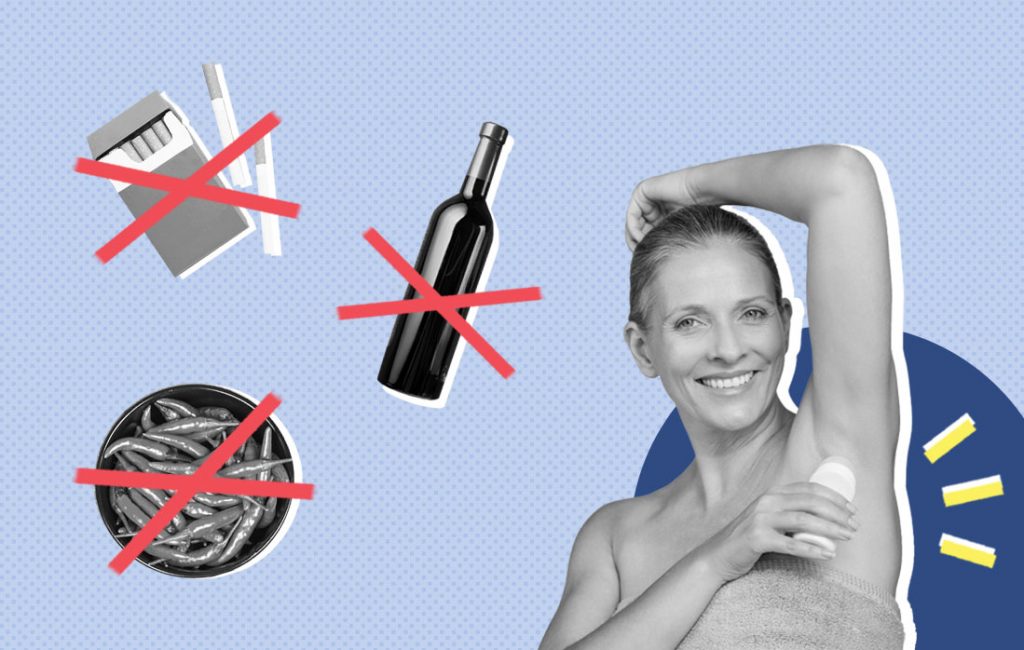If you or your loved one suffers from hyperhidrosis, an excessive sweating disorder, you know that it can affect your sleep. In this article, we’ll learn about hyperhidrosis, how it impacts restful sleep, and what you can do about it.
While I’ve spoken to multiple experts for advice on this subject, please keep in mind that I’m not a healthcare professional. Any medical concerns you may have should be directed to your healthcare provider.
What is Hyperhidrosis?
 A 2017 study in the Annals of Dermatology notes that hyperhidrosis is a disorder characterized by excessive sweating and typically affects the palms, soles, face, scalp, and armpits. The study also states that hyperhidrosis affects nearly 3% of people. (1)
A 2017 study in the Annals of Dermatology notes that hyperhidrosis is a disorder characterized by excessive sweating and typically affects the palms, soles, face, scalp, and armpits. The study also states that hyperhidrosis affects nearly 3% of people. (1)
As Dr. Nikola Djordjevic of HealthCareers.co says, hyperhidrosis causes folks to abnormally sweat regardless of the temperature or whether or not they’ve done physical activity. He says that while it’s harmless, this condition can be very uncomfortable and embarrassing.
A 2017 study in Dermatology and Therapy suggests that hyperhidrosis can be genetic, with 65% of sufferers reporting a history of the disease in their family. (2) Although, as Dr. Eric Nofzinger of Ebb Therapeutics pointed out to me, the causes of hyperhidrosis are still unknown.
According to a 2014 study in Clinical, Cosmetic and Investigational Dermatology, hyperhidrosis is prevalent among individuals between the ages of 25 and 64, equally affects males and females, and is most common in the armpit. It also notes that the treatment of hyperhidrosis will depend on the patient, and may include surgery or unique therapies such as lasers and microwave technology. (3)
Hyperhidrosis and Sleep
 A 2020 study in Dermatology and Therapy identified 44,384 patients with hyperhidrosis and found that the disease can cause increased depression and/or anxiety. (4) As we at Sleepopolis know, depression and anxiety can cause sleep issues, such as making it difficult to fall asleep and stay asleep due to racing thoughts.
A 2020 study in Dermatology and Therapy identified 44,384 patients with hyperhidrosis and found that the disease can cause increased depression and/or anxiety. (4) As we at Sleepopolis know, depression and anxiety can cause sleep issues, such as making it difficult to fall asleep and stay asleep due to racing thoughts.
Dr. Djordjevic confirmed that hyperhidrosis can diminish sleep quality and reduce the overall amount of restful sleep you’re getting. But does it affect all people with hyperhidrosis the same?
The answer depends on the person. For instance, Dr. Anna H. Chacon of Smart Style Today told me that sweating typically decreases when you’re asleep, but as Dr. Marisha Garshick of Certain Dri pointed out, folks with hyperhidrosis may not sweat at night at all.
That’s not to say that all people with hyperhidrosis won’t sweat while they sleep. As the US National Library of Medicine points out, people with hyperhidrosis may sweat when they’re asleep, even if the temperature is cool, since they have overactive sweat glands. (5) While she says sweating at night may not occur, Dr. Garshik notes that those who experience sweating at night might have interrupted sleep.
Night Sweats
 If you sweat at night, but don’t suffer from hyperhidrosis, you may be experiencing night sweats. While separate from hyperhidrosis, night sweats present similar issues, specifically as they relate to sleep.
If you sweat at night, but don’t suffer from hyperhidrosis, you may be experiencing night sweats. While separate from hyperhidrosis, night sweats present similar issues, specifically as they relate to sleep.
According to Ireland’s nidirect government site, night sweats are characterized by abnormal sweating that can cause folks to wake up in the night soaked in their own sweat. (6) Unlike hyperhidrosis, night sweats do not impact each gender equally. According to the US National Library of Medicine, night sweats are more common in women than men. (7)
Dr. Garshick informed me that night sweats can cause lack of sleep, which can also have a negative impact on a person’s mood. The US Food and Drug Administration agrees, saying that night sweats may lead to stress, sleeping problems, or tiredness. (8)
A 2013 study in Climacteric also states that night sweats can reduce your quality of sleep. It says that night sweats are common among 20-25% of menopausal women and, like hyperhidrosis, can cause embarrassment and discomfort. (9)
Night sweats can lead to more than just stress and fatigue. For instance, night sweats have also been linked to an increased risk of developing heart disease over a 14-year period. (10) So while they may seem harmless, they could present serious issues.
How to Reduce Sweating
While hyperhidrosis and night sweats present multiple issues, there are work-arounds. I spoke with multiple medical experts to give you some tips on how you can reduce your perspiration at night.
1. Use an Antiperspirant
According to Dr. Garshik, you may want to consider applying antiperspirant at bedtime. “This is because antiperspirants work by plugging up the sweat glands to block the release of sweat, so applying an antiperspirant at bedtime when the sweat glands are empty ensures maximal absorption and greater efficacy,” she says.
Dr. Garshick told me that 68% of Americans don’t read the instructions before applying an antiperspirant and 56% don’t know that applying antiperspirant at night, instead of in the morning, is the best way for it to work properly. In addition, she recommends drying the areas where you plan to apply the antiperspirant before you put it on. Dr. Chacon recommends trying an antiperspirant with aluminum.
2. Apply Aluminium Chloride
After speaking with Susan Bard, MD of Vive Dermatology, I learned that putting an aluminum chloride solution on the areas where you sweat a lot has also been shown to help with various kinds of hyperhidrosis, particularly when it comes to the armpit. If you’re concerned about skin irritation, research has shown that using 15% aluminium chloride in salicylic acid gel may help. (11)
3. Create the Right Sleep Environment
Dr. Bard recommends optimizing your sleep conditions by keeping the temperature cool and sleeping on breathable cotton or bamboo sheets. It may be beneficial to consider using a cooling latex mattress, which typically dissipates body heat better than memory foam. You may also want to remove unnecessary blankets and sheets, according to Dr. Djordjevic. He also recommends wearing breathable pajamas to bed.
4. Cool Your Forehead
If you suffer from night sweats, you may also want to consider cooling your forehead. One of the easiest ways to do this is to use a damp rag with cold water. According to Dr. Nofzinger, this has been shown to help reduce night sweats.
5. Avoid Sweat Triggers and Try Relaxing Exercises
As Dr. Djordevic explained to me, you should cut out sweat triggers at night. These include, but are not limited to, the following:
- Alcohol
- Spicy food
- Cigarettes
He also recommends reducing stress by engaging in relaxing exercises like yoga.
6. Consider Estrogen Replacement Therapy or Medications
The National Cancer Institute (NCI) says estrogen replacement therapy may help control night sweats. However, this may not be an option for women who have had breast cancer. In this case, the NCI recommends talking to your doctor about the benefits of non-estrogen drugs like progesterone and megestrol. (12)
7. Keep Your Home Cool
The US National Library of medicine says that folks with night sweats should consider opening windows. They also recommend circulating the air throughout your home by keeping fans on. In addition to keeping your home cool, they say that wearing loose-fitting cotton clothing might be beneficial. (13)
Last Word From Sleepopolis
As you can see, hyperhidrosis and night sweats can be problematic when it comes to sleep. Applying antiperspirant and aluminum chloride, creating the right sleeping environment, avoiding sweat triggers, and engaging in relaxing exercises, to name a few, can all help you to reduce sweating. This in turn will likely help you sleep better. On a final note, please remember that we’re not medical experts, so the contents of this article should not be taken as medical advice.
References
- Kim, D et al. Treatment of Palmar Hyperhidrosis with Tap Water Iontophoresis: A Randomized, Sham-Controlled, Single-Blind, and Parallel-Designed Clinical Trial. Annals of Dermatology. Dec 2017.
- Grabell, D et al. Current and Emerging Medical Therapies for Primary Hyperhidrosis. Dermatology and Therapy. Mar 2017.
- Stashak, A et al. Management of hyperhidrosis. Clinical, Cosmetic and Investigational Dermatology. Oct 29, 2014.
- Klein, S et al. Treatment Patterns, Depression, and Anxiety Among US Patients Diagnosed with Hyperhidrosis: A Retrospective Cohort Study. Dermatology and Therapy. Dec 2020.
- “Hyperhidrosis.” US National Library of Medicine. www.medlineplus.gov/ency/article/007259.htm
- “Night sweats.” nidirect. https://www.nidirect.gov.uk/conditions/night-sweats
- “Cancer treatment: dealing with hot flashes and night sweats.” US National Library of Medicine. https://medlineplus.gov/ency/patientinstructions/000826.htm
- “Menopause & Hormones Common Questions.” US Food and Drug Administration. https://www.fda.gov/consumers/free-publications-women/menopause-hormones-common-questions
- Hunter, M. Health-related quality of life of women with menopausal hot flushes and night sweats. Climacteric. Jul 2012.
- Herber-Gast, G et al. Hot flushes and night sweats are associated with coronary heart disease risk in midlife: a longitudinal study. BJOG. Nov 7 2014.
- Walling, H et al. Treatment Options for Hyperhidrosis. American Journal of Clinical Dermatology. Aug 21 2012.
- Hot Flashes and Night Sweats (PDQ®)–Patient Version. National Cancer Institute. https://www.cancer.gov/about-cancer/treatment/side-effects/hot-flashes-pdq
- “Cancer treatment: dealing with hot flashes and night sweats.” US National Library of Medicine. https://medlineplus.gov/ency/patientinstructions/000826.htm



























